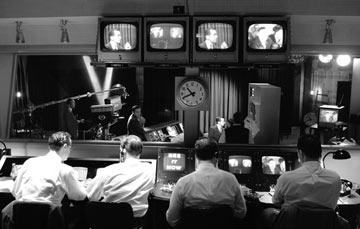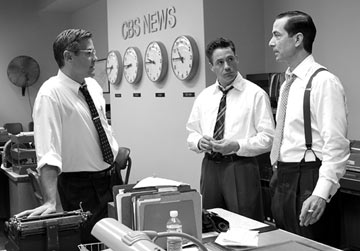George Clooney has left most of the passion out of his new docu-drama, "Good Night, and Good Luck" despite the fact that CBS News icon, Edward R. Murrow, evoked strong feelings from those around him. Senator Joseph McCarthy was one of those who hated him. Joseph Wershba, a CBS writer, editor, correspondent and "60 Minutes" producer, loved Murrow. Let Wershba's own words about Murrow bring to mind some of the passion missing in Clooney's film about the Cold War media collision of Joe McCarthy and Ed Murrow:
"His writing is simple, direct. He used strong, active verbs. On paper, it looked plain. The voice made the words catch fire. He regarded the news as a sacred trust. Accuracy was everything. And, always, fairness." I'm guessing that Clooney eschews a good deal of emotion and sentimentality in "Good Night, and Good Luck" because of the film's very important cautionary message and, in the style and demeanor of Edward R. Murrow himself, less was always more. A lot more. This somewhat stark, black and white motion picture is now brought to the nation's attention at a propitious moment as the U.S. clamors to address all that's now piled so very high on its plate. If Ed Murrow were a middle-aged broadcast journalist today, equipped as he was halfway through the previous century, his worry would not be so much about getting important news programs on the air in the midst of the few opportunities offered by only three national television networks gorged with entertainment. No, it would be how the broadcast journalist approaches the 24-7 news hole that must be filled by the cable news channels and how news-just-for-numbers affects that imperative. Murrow would be writing and speaking eloquently about that, no doubt, even if it were only aired on one of the unprofessional access cable channels one surfs onto occasionally going from CNN to MSNBC. Today, that is the lot of journalist, Bill Moyers, who, in many ways, carries forward the torch that was lit by Murrow in the darkness of World War II. Like Murrow's radio and television programs, "Good Night, and Good Luck" is lean and well-edited. It's short in duration; only 90 minutes. It cuts to the chase soon, as most of us already know what the chase was about: the terrorism of intimidating free speech and expression when those values were considered by many politicians to be unpatriotic. One of Murrow's most famous quotes is: "We must not confuse dissent with disloyalty."
Fine performances are delivered by all the cast; especially David Strathairn as Murrow, and Frank Langella as CBS bossman, William Paley. Robert Downey, Jr. plays Joe Wershba; Patricia Clarkson ("Six Feet Under") is Wershba's wife, Shirley; Jeff Daniels ("The Hours") has the role of Sig Mickelson, the first president of CBS News and one of the founders of the Radio-Television News Directors Association; Murrow sidekick and producer of "See It Now," Fred Friendly is portrayed by the film's director and co-writer, George Clooney. Senator Joseph McCarthy is played by the man who could only play him best: Senator Joseph McCarthy. The Senator appears in the film only as seen in actual film clips and kinescopes. This clearly gives Clooney's film a sense of authenticity, as do the network electronics of the time at CBS. There's also a good deal of actual banter from the McCarthy hearings used in the picture. If you look carefully in the extreme right of the frame during some of those moments, you'll see a young politician by the name of Robert F. Kennedy, who was a member of the McCarthy panel. The film takes a breath, now and then, with some genuine music of the time. Dianne Reeves is heard with a small jazz ensemble, singing some great American popular songs in the vernacular of jazz in an adjacent CBS radio studio. Like Charlie Parker, Edward R. Murrow had and still has his disciples. Murrow was an inspiration and mentor to a long list of other distinguished broadcast journalists; one of whom I wish to thank here for his mentoring of me in this business of broadcast. That would be former CBS News Reporter, Bob Gregory of KTUL-TV News, now busy in his retirement keeping on top of, or should I say, ahead of what's going on in this crazy world.
As a child, the first words I can remember coming from the radio were: "Hi-Yo, Silver!", "On, King, on you huskies!" and "Good night, and good luck!" That last line being the title of a new movie every person who takes his or her citizenship seriously should see.
Tulsa radio during the McCarthy period Official "Good Night, and Good Luck" site. Gary Chew can be reached at garychew@comcast.net. Copyright © 2005, Gary Chew. All rights reserved.
|


